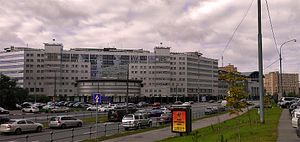As U.S.-Russian relations continue to deteriorate, Russia is trying to reopen a Cold War-era spy base in Cuba.
During Russian President Vladimir Putin’s trip to Cuba earlier this month, Putin and Cuban officials reportedly reached a provisional agreement to reopen the signals intelligence facility in Lourdes, Cuba, south of Havana. “A framework agreement has been agreed,” an unnamed Russian source told Reuters. The reported agreement was first reported by the Russian newspaper, Kommersant.
The Lourdes base was first opened in 1964 and was used to intercept communications in the U.S. and throughout the Western Hemisphere. Some estimate that as much as 50 percent of the radio-intercepted intelligence that the Soviet Union collected on the U.S. during the Cold War came from Lourdes. Putin closed the facility back in 2001, citing it as a “goodwill gesture” toward the U.S., which had long expressed concerns about the Russian spy station. However, many analysts believed the real reason behind the decision was the $200 million-a-year rent that Moscow was reportedly paying to Cuba to maintain the base.
According to The Guardian, “the Lourdes facility was the Soviet Union’s largest foreign base, a mere 155 miles from the U.S. coast. It employed up to 3,000 military and intelligence personnel to intercept a wide array of American telephone and radio communications.”
Russian media quoted unnamed sources from “Russia’s power structures” as saying that: “The decision to return to Cuba can be explained by Russia’s long strengthened financial capabilities, as well as cooling of relations with the U.S.”
Some Russian officials are denying that the base had been shuttered for financial reasons. Col. Gen. Leonid Ivashov, the president of the Academy of Geopolitical Problems, was quoted by Russian media sources as saying: “These are lies. The Lourdes facility cost us nearly as much as it would have if we had operated it on our own territory. The Cubans didn’t charge us anything.” From 1996 to 2001, Ivashov headed Russian Defense Ministry’s main international military cooperation department. However, at the time of the base’s closing, Russian General Staff Anatoly Kvashnin had said the base was costly and unimportant.
When asked why the Lourdes base had been shut down if not for the high cost, Ivashov stated: “There were illusions at the beginning of the last decade that they [the U.S.] were our friends. And if we conceded to them, including by liquidating such an important facility, they would worship us. This is wrong. We see how the Americans are behaving today.”
The U.S. State Department has refused to comment on the reported reopening of the base. However, unnamed U.S. officials told Reuters that reports about the base’s reopening were “propaganda.”
While Putin was in Cuba, he agreed to forgive 90 percent or $32 billion of Cuba’s Soviet-era debt. This move is now being interpreted as a quid pro quo for reopening the spy base at Lourdes.
It is likely that Russia was motivated to reopen the surveillance station in part because of the Edward Snowden leaks about the U.S. National Security Agency’s extensive spying operations. In addition, Ivan Konovalov, head of the Moscow-based Center for Strategic Trends Studies, told Reuters: “One needs to remember that Russia’s technical intelligence abilities are very weak. This will help.” In addition, U.S.-Russian relations have deteriorated sharply since Putin returned to the presidency for a third term in 2012. In fact, U.S. sanctions over the conflict in the Ukraine have led some senior legislators in Russia’s State Duma to advocate withdrawing from the New START nuclear reduction treaty.
During his Latin America trip, Putin also signed agreements with Argentina, Brazil and Cuba to open more positioning stations for Russia’s GLONASS satellite navigation system.
































